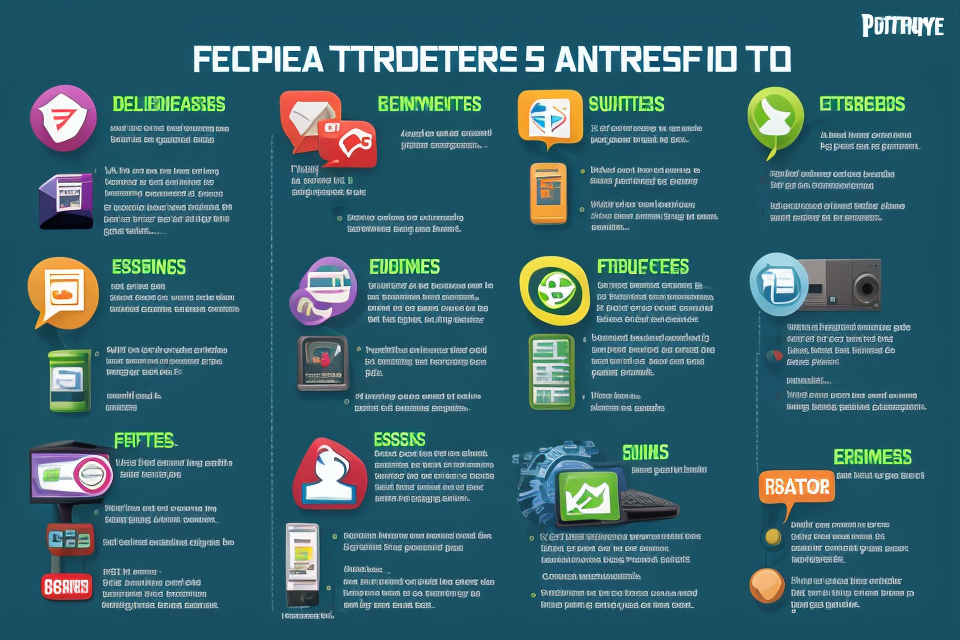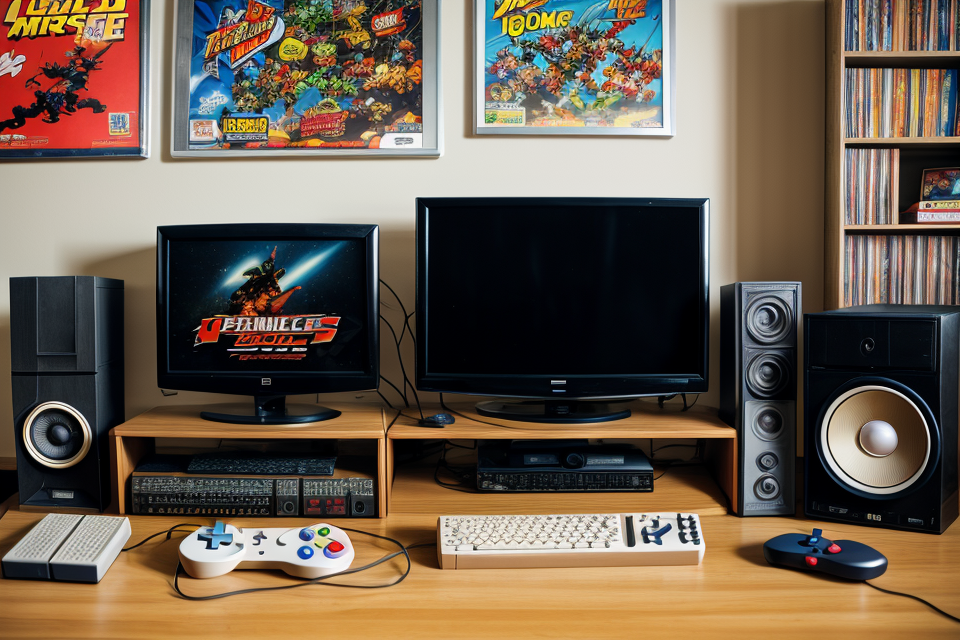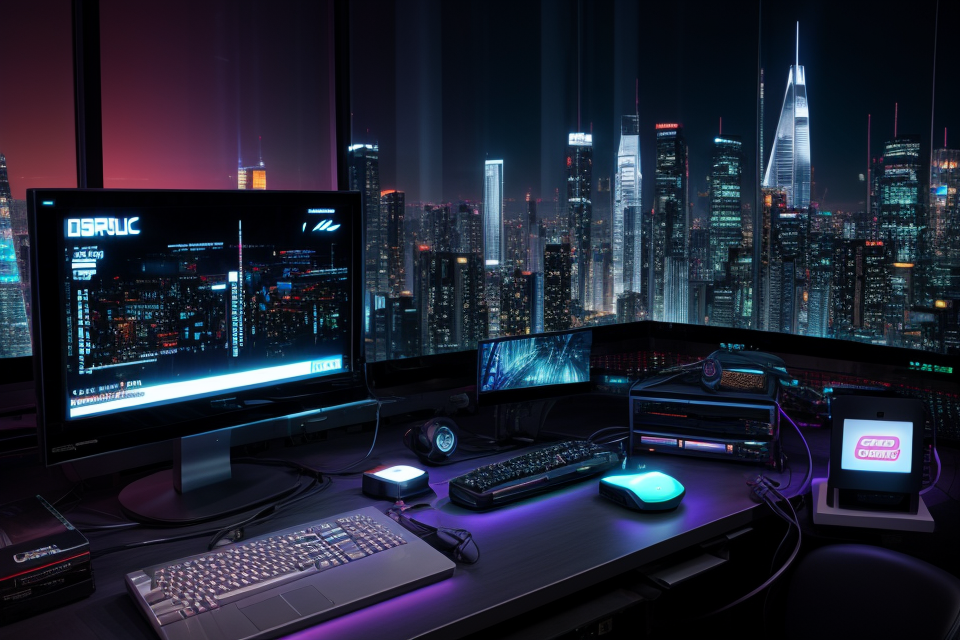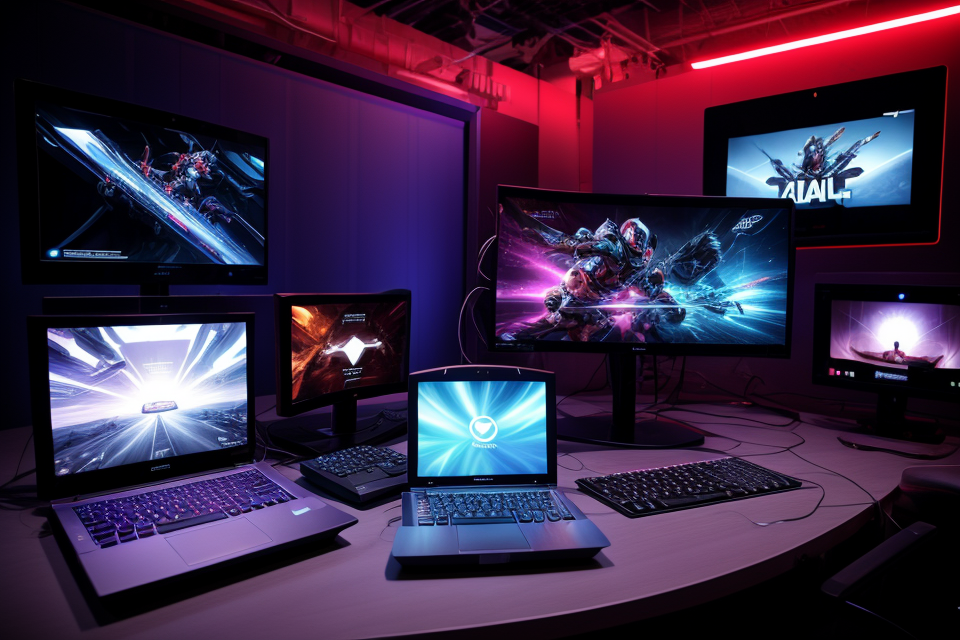
Are you ready to take your gaming experience to the next level but unsure if your computer can handle it? Don’t worry, we’ve got you covered! In this article, we’ll guide you through the process of determining whether a game is compatible with your computer. With a few simple steps, you’ll be able to ensure that you’re able to play your favorite games without any issues. So, let’s get started and find out how to determine game compatibility with your computer!
To determine game compatibility with your computer, you should first check the system requirements for the game. These requirements, which include things like the operating system, processor, and graphics card, will tell you the minimum specifications your computer must meet in order to run the game. If your computer meets or exceeds these requirements, the game should be compatible with your system. However, if your computer does not meet the requirements, the game may not run properly or may not run at all. It’s also a good idea to check for any updates or patches for your operating system and graphics card drivers, as these can sometimes improve compatibility with certain games.
Factors Affecting Game Compatibility
Hardware Requirements
When it comes to determining game compatibility with your computer, hardware requirements play a crucial role. To ensure that a game runs smoothly, it is important to meet the minimum hardware requirements. Here are some of the key hardware components that can affect game compatibility:
- Processor: The processor, also known as the CPU, is responsible for executing instructions and managing the overall performance of the computer. In order to run games smoothly, a computer should have a processor with a sufficient clock speed and number of cores. The recommended processor for gaming should have at least four cores and a clock speed of 3.0 GHz or higher.
- RAM: Random Access Memory, or RAM, is responsible for storing data temporarily during the execution of programs. It is essential to have enough RAM to run games smoothly, as games require a lot of memory to load levels, textures, and other graphical elements. The recommended amount of RAM for gaming is 8 GB or higher.
- Graphics Card: The graphics card, also known as the GPU, is responsible for rendering images and handling the computer’s graphical output. A powerful graphics card is essential for running games, especially those with high-resolution textures and realistic graphics. The recommended graphics card for gaming should have at least 2 GB of VRAM and a clock speed of 2.0 GHz or higher.
- Storage: Storage refers to the amount of space available on the computer’s hard drive or solid-state drive. Games require a certain amount of storage space to install and run, so it is important to have enough storage available. The recommended amount of storage for gaming is at least 500 GB or higher.
By considering these hardware requirements, you can determine whether your computer is compatible with a particular game. If your computer meets or exceeds the recommended specifications, you can expect a smoother gaming experience with fewer performance issues.
Operating System
The operating system (OS) is a crucial factor that affects the compatibility of a game with your computer. Here are some aspects of the OS that you need to consider:
Version and Updates
The version of the OS you are using can impact the compatibility of a game with your computer. Most games require a specific version of the OS to run smoothly, and using an outdated version can lead to compatibility issues. Moreover, it is essential to keep your OS updated to ensure that your computer can run the latest games. Updates can include bug fixes, security patches, and performance enhancements that can improve the overall gaming experience.
64-bit Compatibility
The 64-bit architecture is the latest technology used in computing. It provides better performance and more advanced features compared to the 32-bit architecture. Most modern games require a 64-bit OS to run, as they are designed to take advantage of the additional resources provided by the 64-bit architecture. Therefore, it is essential to ensure that your computer is running a 64-bit compatible OS to enjoy the latest games without any compatibility issues.
Additional Software
In order to determine game compatibility with your computer, it is important to consider the additional software that may be required to run the game smoothly. This may include:
- DirectX: DirectX is a collection of APIs (Application Programming Interfaces) that are used to handle multimedia tasks such as video and audio playback, 3D graphics rendering, and game development. Some games may require a specific version of DirectX to be installed on your computer in order to run properly.
- Visual C++: Visual C++ is a software development environment created by Microsoft. It is used to create Windows applications and games. Some games may require a specific version of Visual C++ to be installed on your computer in order to run properly.
- Other necessary drivers: Depending on the hardware components of your computer, you may need to install specific drivers in order to run a game. For example, if you have a graphics card from a specific manufacturer, you may need to install the corresponding graphics driver in order to play certain games.
It is important to note that these additional software requirements may vary depending on the specific game you are trying to run. It is always a good idea to check the system requirements for a game before attempting to run it on your computer.
Assessing Game Compatibility
Checking System Requirements
One of the primary ways to determine game compatibility with your computer is by checking the system requirements. These requirements specify the minimum and recommended specifications that a computer must meet to run the game smoothly. By comparing the system requirements with your computer specifications, you can assess whether your computer can handle the game or not.
To check the system requirements, you can follow these steps:
- Locate the system requirements: The first step is to find the system requirements for the game. You can usually find this information on the game’s official website or store page. Some games may also provide this information in the product description or in a separate section.
- Read the system requirements: Once you have located the system requirements, read through them carefully. The system requirements typically include the following information:
- Operating System (OS): The minimum and recommended OS versions required to run the game.
- Processor (CPU): The minimum and recommended CPU specifications required to run the game.
- Memory (RAM): The minimum and recommended RAM requirements to run the game.
- Graphics Card (GPU): The minimum and recommended GPU specifications required to run the game.
- Storage: The minimum and recommended storage space required to install the game.
- Compare with your computer specifications: After reading the system requirements, compare them with your computer specifications. Check whether your computer meets the minimum and recommended specifications for each component. If your computer does not meet the minimum requirements, the game may not run smoothly or may not run at all.
In conclusion, checking the system requirements is an essential step in determining game compatibility with your computer. By comparing the system requirements with your computer specifications, you can assess whether your computer can handle the game or not. If your computer does not meet the minimum requirements, you may need to upgrade some components to run the game smoothly.
Using System Information Tools
When determining game compatibility with your computer, system information tools can be a useful resource. These tools provide detailed information about your computer’s hardware and software specifications, which can help you identify potential issues that may arise when running a particular game.
There are several built-in Windows tools that can be used to gather system information, such as the System Information tool and the Resource Monitor. The System Information tool provides a comprehensive overview of your computer’s hardware and software specifications, including the operating system, CPU, memory, and storage devices. The Resource Monitor, on the other hand, allows you to monitor the performance of your computer’s resources in real-time, including CPU usage, memory usage, and disk activity.
In addition to the built-in Windows tools, there are also several third-party applications that can be used to gather system information, such as Speccy and GPU-Z. Speccy provides a comprehensive overview of your computer’s hardware specifications, including the CPU, memory, storage devices, and graphics card. GPU-Z, on the other hand, provides detailed information about your graphics card, including the GPU model, memory size, and driver version.
Using system information tools can help you identify potential issues that may arise when running a particular game, such as inadequate memory or an outdated graphics card driver. By identifying these issues, you can take steps to address them and ensure that your computer is properly configured to run the game smoothly.
Benchmarking
When assessing game compatibility with your computer, benchmarking is a crucial step to evaluate the performance of your system. Benchmarking involves running a brief game or demo to monitor the performance indicators such as frames per second (FPS) and average frame rate. This helps you to determine whether your computer can handle the game’s requirements or not.
There are several games and demos available online that can be used for benchmarking purposes. You can download these games or demos and run them on your computer to check its performance. It is recommended to run the game or demo at its highest settings to get an accurate reading of your system’s capabilities.
Moreover, you can also use benchmarking tools specifically designed for this purpose. These tools provide detailed information about your system’s performance, including the frame rate, CPU usage, and GPU usage. This information can help you to identify any bottlenecks in your system and make necessary adjustments to improve its performance.
Overall, benchmarking is an effective way to assess game compatibility with your computer. It helps you to determine whether your system can handle the game’s requirements and identify any potential issues that may affect its performance. By using benchmarking tools and running games or demos, you can ensure that your computer is up to the task of running the game smoothly and efficiently.
Troubleshooting and Optimization
Adjusting Settings
Adjusting the settings of a game can help improve its compatibility with your computer. Here are some settings that you can adjust:
Reducing graphics quality
One of the most effective ways to improve game compatibility is by reducing the graphics quality. This can be done by lowering the resolution, turning off anti-aliasing, and reducing the texture and shader quality. This will reduce the strain on your computer’s graphics card and help the game run more smoothly.
Disabling unnecessary effects
Some games have effects that are not necessary for gameplay, but can still impact your computer’s performance. These effects include motion blur, depth of field, and lens flares. Disabling these effects can help improve game compatibility and make the game run more smoothly.
Lowering resolution and screen size
Lowering the resolution and screen size of a game can also help improve its compatibility with your computer. This can be done by selecting the lowest resolution and screen size options in the game’s settings. This will reduce the strain on your computer’s graphics card and help the game run more smoothly.
By adjusting these settings, you can improve the compatibility of a game with your computer and make it run more smoothly. However, keep in mind that adjusting these settings may also affect the overall visual quality of the game.
Updating Drivers and Software
Maintaining the compatibility of your computer with the latest game releases is essential for seamless gameplay. Updating your drivers and software is a crucial step in ensuring that your computer meets the requirements of the game. Here are some specific steps you can take to update your drivers and software:
- Graphics card drivers: Your graphics card driver is responsible for managing the communication between your graphics card and your computer’s operating system. Outdated graphics card drivers can cause compatibility issues with certain games. To update your graphics card driver, you can visit the website of the graphics card manufacturer and download the latest driver compatible with your graphics card model. It is important to ensure that you download the correct driver for your graphics card to avoid any potential issues.
- Other necessary software: In addition to graphics card drivers, there are other software components that are essential for gaming. These include DirectX and Visual C++. DirectX is a collection of APIs that enables the communication between the game and the operating system. Visual C++ is a compiler that is used to create the executable files of the game. Updating these software components can help resolve compatibility issues and improve the overall performance of the game. You can download the latest versions of these software components from the Microsoft website.
It is important to note that updating your drivers and software may not always resolve compatibility issues. Some games may require additional hardware upgrades or modifications to run smoothly. However, updating your drivers and software is a good starting point for troubleshooting compatibility issues with your computer.
Overclocking and Undervolting
When it comes to gaming, many players want to squeeze out every last drop of performance from their computer. Overclocking and undervolting are two methods that can potentially increase performance without requiring any hardware upgrades. However, it’s important to exercise caution as these methods can also pose risks to stability and system health.
Overclocking
Overclocking is the process of increasing the clock speed of a computer’s processor beyond its default setting. This can provide a temporary boost in performance, allowing the computer to handle more demanding tasks. However, overclocking can also cause instability and even damage to the processor if done improperly.
To overclock a processor, you’ll need to access the BIOS settings of your computer. The process varies depending on the motherboard manufacturer, but typically involves adjusting the clock speed settings in the advanced or hidden menus. It’s important to note that overclocking can void your computer’s warranty and may not be supported by all software and games.
Undervolting
Undervolting is the opposite of overclocking – instead of increasing the clock speed, it involves reducing the voltage supplied to the processor. This can also provide a temporary boost in performance, as well as lower temperatures and power consumption. However, undervolting can also cause instability and damage to the processor if done improperly.
To undervolt a processor, you’ll need to access the BIOS settings of your computer and find the voltage control settings. Again, the process varies depending on the motherboard manufacturer, but typically involves adjusting the voltage settings to a lower value. It’s important to note that undervolting can also void your computer’s warranty and may not be supported by all software and games.
It’s important to note that overclocking and undervolting can have a significant impact on the stability and lifespan of your computer. If you’re not comfortable with these methods, it’s recommended to seek the assistance of a professional or avoid making these changes altogether. Additionally, it’s important to monitor your computer’s performance and temperatures closely to ensure that it’s operating within safe parameters.
Seeking Help and Alternatives
Online Communities
In the digital age, online communities have become an essential resource for individuals seeking help and advice regarding game compatibility with their computers. There are numerous online platforms that offer valuable insights and support to gamers struggling with compatibility issues. Some of the most popular online communities include game-specific forums and hardware and software support forums.
Game-specific forums are platforms dedicated to discussing specific games and their compatibility issues. These forums provide gamers with a wealth of information and guidance on how to troubleshoot game-related problems. Gamers can seek advice from fellow players who have experienced similar issues, as well as from game developers and technical experts. By engaging with the community, individuals can learn about the latest updates and patches, which may resolve compatibility issues.
Hardware and software support forums are platforms where users can seek assistance with a wide range of computer-related issues, including game compatibility. These forums provide a space for users to ask questions, share experiences, and offer solutions to common problems. Technical experts and other knowledgeable individuals often participate in these forums, providing valuable insights and guidance on how to resolve compatibility issues. By engaging with the community, individuals can learn about the latest hardware and software developments, which may impact game compatibility.
In summary, online communities are a valuable resource for individuals seeking help and alternatives to determine game compatibility with their computers. By engaging with other gamers and technical experts, individuals can gain valuable insights and guidance on how to troubleshoot and resolve compatibility issues.
Game Compatibility Tools
When it comes to determining game compatibility with your computer, there are several tools available that can help you identify whether a game will run smoothly on your system or not. Here are some popular game compatibility tools that you can use:
PCGameCompat
PCGameCompat is a free tool that can help you check the compatibility of your games with your PC. It uses a combination of built-in checks and community-contributed data to determine whether a game is likely to run well on your system or not. PCGameCompat also provides detailed information about the hardware requirements of a game, which can help you make informed decisions about whether to install it or not.
One of the best things about PCGameCompat is that it is very easy to use. All you need to do is download and install the tool, and then run it to check the compatibility of your games. PCGameCompat will scan your system and provide you with a detailed report about the games that are likely to run well on your system, as well as those that may encounter compatibility issues.
GeForce Experience
GeForce Experience is a popular tool that is designed specifically for Nvidia GPU owners. It is a free tool that can help you optimize the performance of your games by automatically adjusting various settings to ensure that they run smoothly on your system. GeForce Experience also includes a built-in game compatibility checker that can help you determine whether a game is likely to run well on your system or not.
One of the best things about GeForce Experience is that it is very easy to use. All you need to do is download and install the tool, and then run it to check the compatibility of your games. GeForce Experience will scan your system and provide you with a detailed report about the games that are likely to run well on your system, as well as those that may encounter compatibility issues.
In addition to the built-in game compatibility checker, GeForce Experience also includes several other features that can help you optimize the performance of your games. For example, it can automatically adjust the graphics settings of your games to ensure that they run smoothly on your system, and it can also record and stream your gameplay to various platforms.
Overall, if you are an Nvidia GPU owner and you want to optimize the performance of your games, GeForce Experience is definitely worth checking out. It is a free tool that can help you get the most out of your gaming experience, and it is very easy to use.
Alternative Games
When facing game compatibility issues, exploring alternative games with better compatibility can be a viable solution. By doing so, you can still enjoy gaming without having to put up with performance problems or technical difficulties. Here are some ways to find alternative games that work well with your computer:
Exploring Similar Games with Better Compatibility
One approach is to look for games that are similar to the one you initially wanted to play, but have better compatibility with your computer. This way, you can still experience a game that is similar to your preferred title, while avoiding the compatibility issues that you might encounter. To find similar games, you can use online game databases or gaming forums to get recommendations from other players. You can also check out reviews and ratings to see which games are most compatible with different types of computers.
Optimizing Existing Games through Tweaks and Workarounds
Another option is to optimize existing games that you already own or want to play, through tweaks and workarounds. This can involve adjusting graphical settings, disabling certain features, or using specific software or hardware to improve performance. You can research online for specific optimization tips for your game and computer setup, or seek help from gaming communities or forums.
Overall, exploring alternative games or optimizing existing games can be effective ways to overcome game compatibility issues and ensure a smoother gaming experience.
FAQs
1. How can I determine if a game is compatible with my computer?
To determine if a game is compatible with your computer, you should check the game’s system requirements. These can usually be found on the game’s official website or in the manual. Make sure your computer meets or exceeds the minimum requirements for the game, such as the required CPU, RAM, and graphics card. You can also use a tool like Can You Run It to check if your computer can handle the game.
2. What happens if my computer doesn’t meet the minimum requirements for a game?
If your computer doesn’t meet the minimum requirements for a game, it may not run properly or may have technical issues. The game may run slowly, have graphics issues, or not work at all. It’s important to check the system requirements before purchasing the game to ensure that your computer can handle it.
3. Can I still play a game on my computer if it doesn’t meet the recommended requirements?
It depends on the game and your computer’s specifications. If your computer only meets the minimum requirements, the game may not run smoothly or may have technical issues. However, if your computer exceeds the recommended requirements, you may be able to play the game without any issues. It’s always a good idea to check the system requirements and the game’s performance on your specific computer before purchasing it.
4. How can I improve my computer’s performance to run games?
There are several ways to improve your computer’s performance to run games. One option is to upgrade your graphics card, which can significantly improve your computer’s ability to handle graphically intensive games. You can also increase the amount of RAM in your computer, which can help with overall performance. Additionally, making sure your computer is running the latest operating system and drivers can also improve performance. Finally, closing any unnecessary programs or processes while playing a game can help improve performance.


